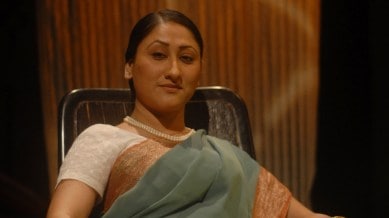📣 For more lifestyle news, click here to join our WhatsApp Channel and also follow us on Instagram
Jayati Bhatia on being remembered as ‘Mataji’, love for the stage: ‘Theatre cleanses me of things I do on other media platforms’
"After working with Mr Sanjay Leela Bhansali, Karan Johar and all the OTT channels, what brings me back to theatre is my love for the medium," Jayati Bhatia added

In her three-decade-long career, Jayati Bhatia has essayed memorable roles—from Nirmala “Mataji” Bharadwaj in Sasural Simar Ka and Geeta Sanjay Basu in Kasautii Zindagii Kay, to Phatto in Heeramandi— but her heart remains with theatre. “True appreciation comes when the audience remembers or commends your work on stage. That is what truly makes my soul happy,” she told indianexpress.com.
Fresh from a three-city tour as Khatijabai in Quasar Thakore Padamsee’s one-woman show Khatijabai of Karmali Terrace, Jayati Bhatia spoke about her journey, including TV, theatre, and her professional aspirations. Read edited excerpts below.
monthly limit of free stories.
with an Express account.
Q. You have been an integral part of the TV industry for years now. How do you react to/perceive comments like the content is extremely regressive and even sexist, at times?
Jayati Bhatia: Television shows are not regressive; they are a bitter pill coated with sugar. Many women—about 10 per cent—have been inspired by these shows to step out, work, take over businesses, and educate themselves. The characters are never weak—they find their voice. Even the ones at home who may not be as empowered still see examples of courage through these characters.
Many young girls have thanked me for playing Mataji. They saw her supporting her granddaughter to study abroad and felt empowered to pursue their own dreams. So yes, my character has changed mindsets, and that is wonderful.
Q. Like you mentioned, despite doing many roles, you are most recognised as ‘Mataji’. Is that how you want to be remembered?
Jayati Bhatia: Yes, Mataji is one of my favourite characters, and I’m very proud to have played that part. She moulded her life according to the times—understanding technology, supporting women in her family in achieving their dreams, and following her own. Being remembered as Mataji is a source of pride because it brings respect and love from the audience.
Q. Let’s talk about theatre and your powerful performance in Khatijabai of Karmali Terrace. Could you tell us about the role and why you decided to take it on?
Jayati Bhatia: It’s been 21 years of playing Khatijabai, and I still get excited about the play. Even today, the character resonates because, like all of us, she navigates social expectations at home and work.
Q. What type of research did you do to prepare for Khatijabai?
Jayati Bhatia: A lot of research was done by Quasar and me for the character, as she’s a Khoja Muslim woman. So, it entailed the kind of life they live, their mindset, and how they are very English-inspired, and do not have a custom of working under somebody. So, in the play, when Aziz goes away to work with somebody, Khatijabai takes it as a personal failure.
Q. Do you find anything in common between yourself and your on-stage character in Khatijabai of Karmali Terrace?
Jayati Bhatia: I see my mother, grandmother, and many women in her. Khatijabai is progressive and adapts with time. She manipulates, loves, and leads—a reflection of real-life experiences I recognise in myself.
She was only nine when she entered the household of Karmali Terrace, and over the years, she manipulated her way into it and became the centre of the home — only to question, at the end, if it was worth it. As the years have passed, I have come to realise that I understand Khatijabai more and more, because I am gaining a deeper understanding of life, and in life, nothing comes easily. When I look back, I realise that yes, I may have also manipulated a little bit, and while giving my best and loving people the way Khatijabai did, I may have been a little controlling.
Q. Despite working with stalwarts like Sanjay Leela Bhansali and tasting commercial success with Rocky Aur Rani Kii Prem Kahaani, what brings you back to the theatre?
Jayati Bhatia: I come because theatre remains my true passion. It is my soul and happiness. Yes, I have earned money through television, gained recognition through Heeramandi, and accomplished all the other work I have done in front of the camera, but I am happiest when someone tells me they have watched my plays and loved them. That is what truly makes my soul happy. Theatre cleanses me of everything I do on other platforms.
Q. Have you achieved your professional goal?
Jayati Bhatia: Well, actors are inherently dissatisfied. As soon as we achieve one goal, we set our sights on the next. So, I have not reached my professional goals, and have many, many miles to go before I sleep, before I hang my boots.
📣 For more lifestyle news, click here to join our WhatsApp Channel and also follow us on Instagram